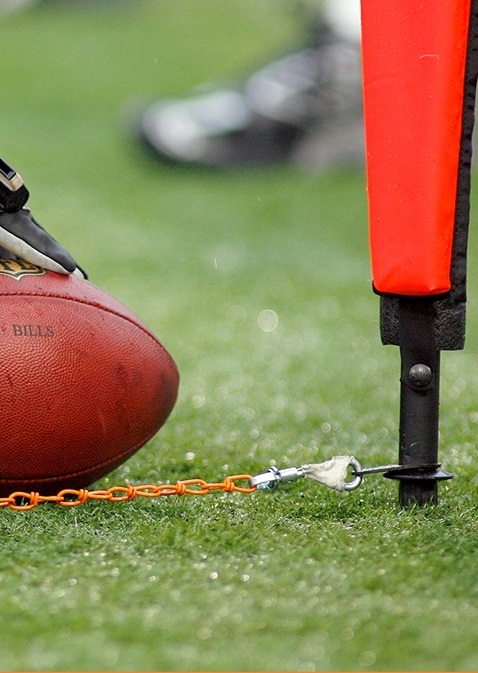 Sports are so much a part of our daily lives that we all use sports idioms to communicate, sometimes not even knowing the athletic history of the expression. Whether it is to criticize someone or appreciate the performance of a co-worker, sports phrases are typically used in everyday life.
Sports are so much a part of our daily lives that we all use sports idioms to communicate, sometimes not even knowing the athletic history of the expression. Whether it is to criticize someone or appreciate the performance of a co-worker, sports phrases are typically used in everyday life.
If you are a sports fan, you will love these sports-based phrases that can be applied to so many life situations. Let’s check out a few such expressions you probably use everyday.
- Game of Inches
Sometimes, the small things can make all the difference between success and failure – not only on the sports field, but in all aspects of life. In football, teams can lose a game by small margins. Likewise, people who are ready to fight for that extra inch are sure to win in the end.
It can be very easy to think of sports purely as a physical endeavor, but there’s so much mental stamina needed as well. Bloggers like Kevin Morgan of Pittsford NY advocate for “The 10% Rule,” which recommends not increasing your running mileage by more than 10% a week. This is incredibly practical, but also means that you’re not overexerting and letting your nervous system adapt naturally. We should always remember that sports are as much about the mental capacity as the physical. When we have an advantage by a very minimal margin, this game of inches can mean the difference between winning and losing.
- The Ball is in Their Court
This idiom is taken from tennis. In this sport, once you’ve hit the ball, it is up to the opponent to take the next step. Similarly, when the ball is in someone else’s court, this means you have tried everything in your power and the final decision is now up to the other party. The saying can often apply to daily life and business dealings.
- Keep Your Eye on the Ball
You’ve probably heard this expression. Keeping your eye on the ball means focusing on the prize. For cricketers, footballers, and tennis players, it is important to keep their full focus on the ball. If you miss the ball, you lose the game. The same applies at work and at home – losing focus can be detrimental to success.
- Next Man Up
In cricket, when one batsman is out, another one comes in to bat. The same thing goes for business. If an employee is fired, another employee fills the void. Next man up is an expression used to describe the next person to step into the role.
- Pass the Baton
Have you ever seen a relay race? For a 400-meter race, four players work together to complete the race. Each player has to run 100 meters and pass the baton to the next runner who carries on the race. In this idiom, passing the baton means passing your responsibilities or a portion of work to another team member. Passing tasks and projects on to others is an important part of team work.
- Knee Knocker
The term “knee knockers” is taken from golf. This idiom is to do with the short putt that can cause trouble for golf players. A short putt should be easy for any golfer, but often turns out to be the most challenging. This is because the nerves set in under the extreme pressure of the situation. Therefore, knee knockers are the missed shots that should have been easy. In everyday life, a knee knocker is used to describe any stressful situation that makes you nervous and causes you to falter.
- Take One for the Team
Have you ever done something difficult or made a sacrifice for the good of the group? Taking one for the team means sacrificing your time and effort for the benefit of the team. In the business world, the phrase “take one for the team” applies to a player who takes on the most difficult tasks to ensure that their team wins. In a family setting, taking one for the team means making sacrifices for the good of the family.
- Punt
The term punt comes from football and roughly translates as “to give up”. When you are exhausted from work, relationships, or any aspect of life, you can be tempted to give up. In football, a punt means throwing the ball to the opponent. In the same way, a punt in our daily life means passing your responsibility onto someone else.
- Utility Player
In baseball, a competent player is someone who’s capable of performing multiple tasks at the same time and they are also known as a utility player. This term can also apply in a work setting, to anyone who manages a range of tasks needing different skill sets. Therefore, a utility player is anyone good at multi tasking, someone who can balance different tasks and projects at the same time.
- Dropped the Ball
In cricket, dropping the ball often proves the costliest mistake for the team. Most of us have seen the tragic moment when the ball is in the air and the fielder drops the catch. The same applies to our work and everyday life. In this context, this term means making mistakes or handling things inappropriately. Forgetting to make a callback, missing an opportunity, or failing to deliver a presentation are a few examples of dropping the ball.
Just as the lessons we learn from sports can apply to work and personal settings, many sports phrases also apply to our day-to-day lives.
